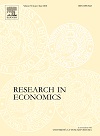Strategic Dissent in the Hotelling-Downs model with Sequential Entry and Private Information,

We analyze the Hotelling–Downs model of winner-take-all elections with sequential entry where n≥2 ‘office-seeking’ candidates with privately known qualities choose entry decisions and commit to policy platforms on entering. Voters receive informative public signals about the quality of each contestant once all platforms are announced. We characterize two-party equilibria when the order of entry is exogenously given. In these equilibria, entry can occur in any ‘round’ with positive probability: high-quality candidates signal their type through showing ideological dissent with the voters while low-quality ones randomize between (mis)-signaling quality through dissent and staying out. Interestingly, while informative public signals can keep low-quality candidates out of competition up to a certain degree, electoral competition improves the voter׳s information about candidate types beyond what the signals can reveal. However this endogenous mechanism of strategic information transmission leads to political polarization.
Strategic Dissent in the Hotelling-Downs model with Sequential Entry and Private Information,

We analyze the Hotelling–Downs model of winner-take-all elections with sequential entry where n≥2 ‘office-seeking’ candidates with privately known qualities choose entry decisions and commit to policy platforms on entering. Voters receive informative public signals about the quality of each contestant once all platforms are announced. We characterize two-party equilibria when the order of entry is exogenously given. In these equilibria, entry can occur in any ‘round’ with positive probability: high-quality candidates signal their type through showing ideological dissent with the voters while low-quality ones randomize between (mis)-signaling quality through dissent and staying out. Interestingly, while informative public signals can keep low-quality candidates out of competition up to a certain degree, electoral competition improves the voter׳s information about candidate types beyond what the signals can reveal. However this endogenous mechanism of strategic information transmission leads to political polarization.
